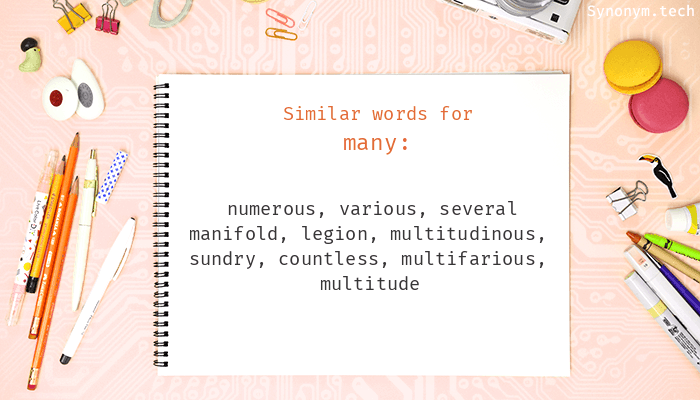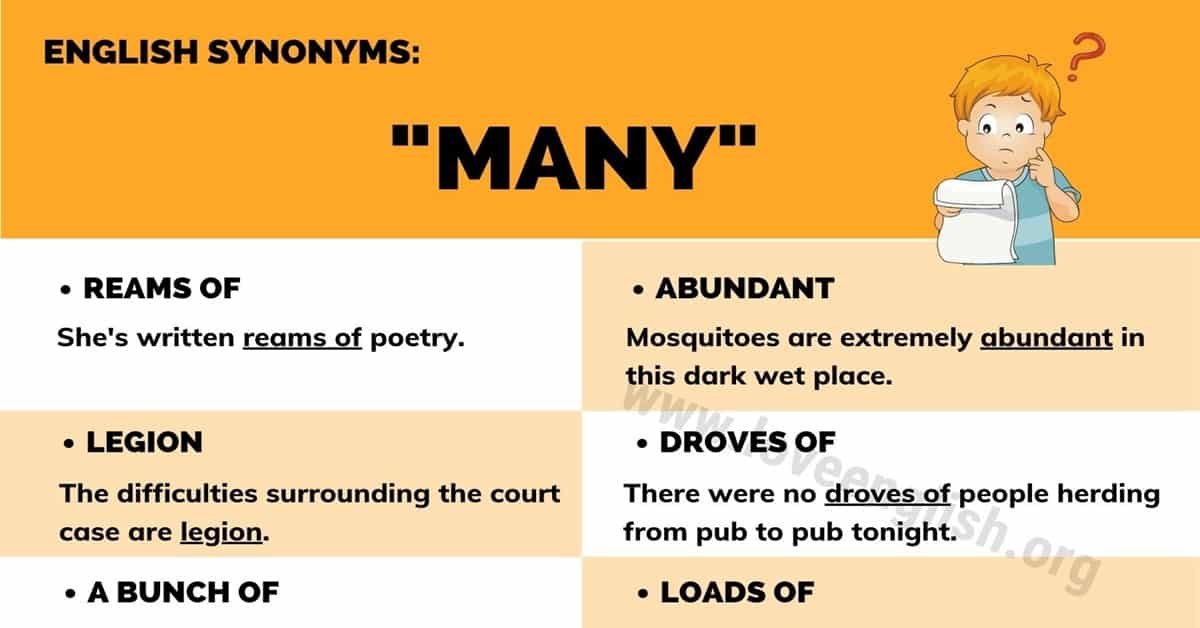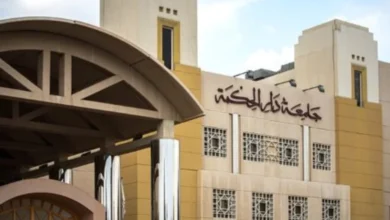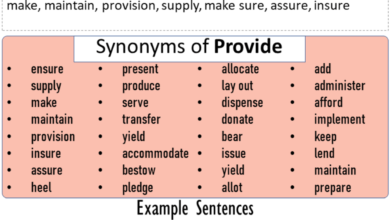Looking for “another word for many“? You’re not alone! There are so many ways to say “many,” and today, we will explore over 20 fantastic alternatives. Whether you’re writing an essay or just want to sound smarter in everyday conversation, having a variety of words can make a huge difference.
In this post, we will take a closer look at these synonyms, breaking them down so you can easily understand when and how to use them. If you want to add variety to your vocabulary, then you’re in the right place. Let’s dive into some of the best options for “another word for many” that will make your language more colorful!
Another Word for Many: Why You Need to Expand Your Vocabulary
When you use different words instead of always saying “many,” your language becomes more exciting and varied. Saying “many” too much can make your sentences sound boring. By learning new words, you can make your writing and speaking more interesting.
Some great alternatives to “many” include words like “numerous,” “several,” and “countless.” Each one has its own special meaning, so using them correctly will help you sound smarter and more confident in what you’re saying. Expanding your vocabulary also makes you a better communicator.

20 Synonyms for Many That Will Make You Sound Smarter
Here are 20 words you can use instead of saying “many”:
- Numerous: Means a lot of things or people.
- Countless: Means too many to count.
- Several: A few, but more than one.
- Many: The basic word we’re replacing!
- Myriad: A very large number of things.
Using these words will make your sentences sound more creative. Whether you’re writing or speaking, you’ll be able to impress your audience by choosing the perfect synonym for “many.”
When to Use ‘Numerous’ Instead of ‘Many’ in Your Writing
“Numerous” is a great word to use when you want to say there are a lot of things or people. It sounds more formal than “many,” so it’s perfect for essays or stories where you want to sound a bit more professional.
You can use “numerous” in many situations. For example, instead of saying “there were many people at the party,” you could say, “there were numerous people at the party.” This makes your sentence sound stronger and more polished.
Exploring ‘Several’ and Other Ways to Say Many
“Several” means more than two but usually not a large number. It’s not as big as “many,” but still shows you have more than just a few. For example, “I have several books on my shelf” means you don’t just have one or two books, but a few more.
“Several” is a great word to use when you don’t want to sound too formal, but still want to show there’s more than one thing. It’s a simple, easy-to-use word that’s perfect for everyday conversations.
How to Use ‘Countless’ and Other Words for Many in Different Situations
“Countless” is a word you can use when there are so many things that it’s hard to count them all. For example, you could say, “There are countless stars in the sky.” This shows there are too many to even start counting.
Other words like “multitude” and “myriad” can also be used in similar situations. These words can be especially helpful when you’re talking about something huge, like the number of people at an event or the number of items in a collection.
‘Myriad’ vs. ‘Many’: Understanding the Difference
“Myriad” is a word that sounds a bit fancy and means a very large number of something. It’s a bit more formal than “many,” but it’s still easy to use. For example, “There are a myriad of reasons to learn new words” sounds a bit more elegant than just saying “many reasons.”
“Myriad” can help make your language stand out. It’s a great option for situations when you want to show that there’s a huge number of things, but you want to sound a bit more sophisticated.
From ‘Loads’ to ‘Plenty’: Choosing the Right Synonym for Many
When you want to talk about “many” in a casual way, words like “loads” and “plenty” are great choices. They’re informal and easy to use in everyday conversations.
- Loads: A casual word meaning a lot of something.
- Plenty: Means there’s enough or more than enough of something.
For example, “I have loads of homework” or “We have plenty of food for everyone” are both ways to say “many” in a more relaxed tone.
The Most Common Alternatives to ‘Many’ You Should Know
Here are some of the most common words you can use instead of “many”:
- Numerous
- Plenty
- Countless
- Several
These words will help you avoid overusing the word “many” in your writing or speaking. By using them, you can make your language more varied and exciting.
Why ‘Numerous’ and ‘Multitudinous’ Are Great Replacements for Many
“Numerous” and “multitudinous” are both excellent words when you want to say there’s a large amount of something. “Numerous” is more commonly used, but “multitudinous” sounds more dramatic and can make your sentences stand out.
For example, “The park was filled with numerous people” sounds clear and professional, while “The park was filled with multitudinous people” adds a bit of flair to your sentence.
‘Several’ or ‘Varied’: Which One Fits Better as Another Word for Many?
“Several” means a few, but not many. It’s a good word to use when you want to show there’s more than one thing but not an overwhelming number.
“Varied” is used to describe something that has many different types or kinds. It’s perfect for when you’re talking about a group of different things. For example, “The team had varied skills” means the team had different types of abilities.
Creative Ways to Say Many: A Beginner’s Guide to Synonyms
Learning new words to replace “many” is fun and easy. Start using words like “plenty,” “loads,” or “myriad” in your daily life to sound more interesting.
Remember, the best word depends on the situation. Whether you’re writing a paper, telling a story, or having a chat with a friend, using a variety of words will make your language more colorful and engaging.

How to Say Many Without Repeating: Simple and Effective Alternatives
No need to use “many” again and again! By mixing up your vocabulary with words like “countless,” “loads,” or “numerous,” you can say more and make your sentences flow better.
The key is to pick the right word for the context. If you’re talking about something big, “countless” might be best. For a more casual situation, “plenty” or “loads” might fit better.
Conclusion:
In conclusion, using “another word for many” can really improve how you speak and write. It makes your language sound more exciting, and it helps you avoid repeating the same word over and over. Whether you use words like “countless,” “several,” or “myriad,” each word has its own special meaning that can change the way you express yourself.
So, next time you’re writing or speaking, think about using a synonym for “many.” It will make your sentences more interesting, and it will help you sound like a more confident speaker and writer. Keep practicing and trying out new words, and soon you’ll have a wide range of vocabulary to choose from!
FAQs:
Q: What is another word for many?
A: Some great alternatives for “many” include “numerous,” “several,” “countless,” and “myriad.”
Q: When should I use “several” instead of “many”?
A: “Several” is used when you want to refer to a few things, but not a lot.
Q: Is “myriad” a good replacement for “many”?
A: Yes, “myriad” is perfect when you want to say there’s a very large number of something.
Q: Can I use “plenty” as another word for many?
A: Yes, “plenty” works well when you want to say there’s enough or more than enough.
Q: What is the difference between “numerous” and “countless”?
A: “Numerous” means a lot, while “countless” means too many to count.






